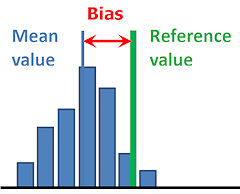Treatment of an observed bias
Content
 Bias is routinely determined during the validation of analytical methods. Usually, the observed bias is not exactly zero. It is then important to decide whether the observed bias can reasonably be treated as unimportant, or whether some further action needs to be taken. This can be particularly difficult to decide when applying the principles of the 'Guide to the Expression of Uncertainty in measurement', which assumes that a correction has been applied for any important bias.
Bias is routinely determined during the validation of analytical methods. Usually, the observed bias is not exactly zero. It is then important to decide whether the observed bias can reasonably be treated as unimportant, or whether some further action needs to be taken. This can be particularly difficult to decide when applying the principles of the 'Guide to the Expression of Uncertainty in measurement', which assumes that a correction has been applied for any important bias.
This information leaflet has been prepared by the Eurachem Measurement Uncertainty and Tracability Working Group (see here for details). The leaflet discusses whether or not an observed significant bias should be corrected and the impact this may have on the measurement uncertainty (MU). The leaflet does not describe how to apply a correction or how to increase the uncertainty to take account of an uncorrected bias, though it does provide relevant literature sources.
Availability
- View the leaflet in Bulgarian [117 kB]
- View the leaflet in English [367 kB] (2022-10-21)*
- View the leaflet in Estonian [535 kB]
- View the leaflet in Farsi [316 kB]
- View the leaflet in German [296 kB]
- View the leaflet in Turkish [134 kB]
- View the leaflet in Ukrainian [290 kB]
* 2nd printing; editorial amendment only
Translation
Translation into other languages is encouraged for members of Eurachem. Other offers of translation should be directed to the Eurachem Secretariat for permission. The Eurachem policy on maintenance and development of Eurachem guidance, available on the Policies page, gives further information on translation.
Publication date
This leaflet was first published in English on 2017-05-27.
* The English copy on this page is a minor (editorial) amendment, published 2022-10-21; the recommendations are unchanged.
- Details
- Last Updated: Friday, 30 May 2025 22:50



